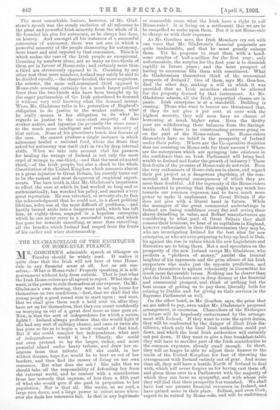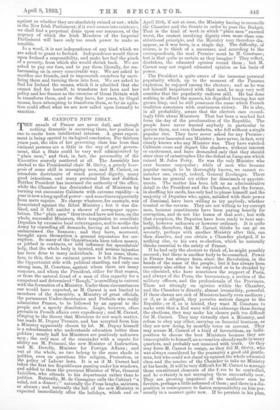THE EX-CHANCELLOR OF THE EXCHEQUER ON HOME-RULE FINANCE.
MR. GOSCHEN'S admirable speech at Glasgow on Tuesday should be widely read. It makes it quite clear that the Irish will not hear of true Home- rule in any financial sense at all. Let us ask our- selves,—What i8 Home-rule ? Properly speaking, it is self- government without help from outside. That is just what the Irish Home-rulers are all agreed to reject. What they do want, is the power to rule themselves at our expense. On Mr. Gladstone's' own showing, they want to set up house for therinielves on two conditions,—first, that we shall find the young people a good round sum to start upon ; and next, that we shall give them such a hold over us, after they have set up for themselves, that they can count confidently on Worrying us out of a great deal more as time goes on. Now, is that the sort of independence for which a nation fights ? Ireland always professes that she would fight if she had any sort of military chance, and once or twice she has gone so far as to begin a mock combat of that kind. But if she could conquer her independence, what sort of .independence would it be ? Clearly, she could not' even pretend to lay the larger, richer, and more powerful island under heavy tribute, and draw her re- sources from that tribute. All she could, in her wildest 'dreams, hope for, would be to beat us out of her borders,• and then find the means of living on her own resources. But what does she ask ? She asks that we should take all the responsibility of defending her from the external world, and be content with a contribution from her towards that expense, of less than a fifth part of *hat she would give if she paid in proportion to her population.' Nor is that all. She wants, as we said, a large. sum down, and a large power to extort more when- ever she finds her resources fail. Is that in any legitimate or reasonable sense what the Irish have a right to call Home-rule ? It is living on a settlement that we are to be compelled to make upon them. But it is not Home-rule to charge us with their expenses.
As Mr. Goschen says, the Irish Members cry out with one voice that Mr. Gladstone's financial proposals are quite inadmissible, and that he must greatly enlarge them. Yet he proposes to start them with a hand- some surplus of half-a-million for the first year ; only unfortunately, the surplus for the first year is to diminish rapidly in future years ; and the mere prospect of having to economise fills them with resentment. What do Gladetonians themselves think of the economical prospects of Ireland ? One of them, says Mr. Goschen, died the other day, making a will in which it was provided that no Irish securities should be allowed for the property devised by that instrument. As Mr. Gladstone admits, all the Irish propertied classes are in panic. Irish enterprise is at a standstill. Building is ceasing. Those who want to borrow are threatened that, if they do not give 4 per cent. at once with the highest security, they will soon have no chance of borrowing at much higher rates. Even the thrifty poor are withdrawing their balances from the Savings- banks. And there is no counteracting process going on on the part of the Home-rulers. The Home-rulers themselves have no belief in the prosperity of Ireland. under their policy. Where are the Co-operative Societies that are counting on Home-rule for their success ? Where are the enterprises which are springing into existence in the confidence that an Irish Parliament will bring back wealth to Ireland and foster the growth of industry ? These first-fruits of the promise of Home-rule do not exist. Even the very enthusiasts of Home-rule are in alarm, and regard their pet project as a dangerous plaything, of the com- mercial and financial consequences of which they are more than doubtful. All the ingenuity of the Home-rulers is exhausted in proving that they ought to pay much less towards our common expenses, and to have much more power to make it unpleasant for Great Britain if she does not give with a liberal band in future. While the managers of the great commercial undertakings in Ireland are losing confidence every day and seeing their shares dwindling in value, and Belfast manufacturers are considering to what part of Great Britain they shall remove their business, we hear of no capitalists in England, however enthusiastic in their Gladstonianism they may be, who are investigating Ireland for the best sites for new enterprise, or who are even preparing to buy-up land in Dub- lin against the rise in values which the new Legislature and Executive are to bring there. Not a soul speculates on the prosperity of the new Ireland except Mr. Gladstone, who predicts a " plethora of money," amidst the ironical laughter of his opponents and the grim silence of his Irish supporters who make just the opposite prediction, and pledge themselves to agitate vehemently in Committee for much more favourable terms. Nothing can be clearer than that the Irish Members are in deep dismay at the financial and commercial prospect, and think of nothing but the best means of getting us to pay them liberally both for retiring, to Dublin and for giving us their services. in the Supreme Parliament as well.
On the other hand, as Mr. Goschen says, the price that we are asked to pay, even under Mr. Gladstone's proposed arrangement, is enormous. Chancellors of the Exchequer in future will be hopelessly embarrassed by the arrange- merit with Ireland. If they want to raise the spirit duties, they will be confronted by the danger of illicit Irish dis- tilleries, which only the local Irish authorities could put down, and which the local Irish authorities will certainly not put down. If they want to give a free breakfast-table, they will have to sacrifice part of the Irish contribution to the common expenses, already small enough. In short, they will no longer be able to adjust their finance to the needs of the United Kingdom for fear of throwing the arrangement with Ireland entirely out of gear. And worse than all, they will have a hostile North of Ireland to deal with, which will never forgive us for having cast them off, and given them over to a Parliament with the majority of which they can have no sympathy, and with whose rule they will find that their prosperity has vanished. We shall have lost our present financial resources in Ireland, and have gained none in their place. Belfast, and even Cork, expect to be ruined by Home-rule, and will be embittered against us whether they are absolutely ruined or not ; while in the New Irish Parliament, if it ever comes into existence, we shall find a perpetual drain upon our resources, of the urgency of which the Irish Members of the Imperial Parliament will have only too much power to make us sensible.
In a word, it is not independence of any kind which we are asked to grant to Ireland. Independence would throw upon Ireland a responsibility, and make her feel the pinch of a poverty, from which she would shrink back. We are asked to pay our foes, and to pay them liberally, for em- barrassing us in every conceivable way. We are asked to sacrifice our friends, and to impoverish ourselves by sacri- ficing them and turning them into foes. We are asked to find for Ireland the means, which it is admitted that she cannot find for herself, to transform her laws and her policy and her finance as the enemies of Great Britain wish to transform them, and as they have, for years, by illegal means, been attempting to transform them, so far as agita- tion could effect what we are now called upon formally to sanction.



































 Previous page
Previous page